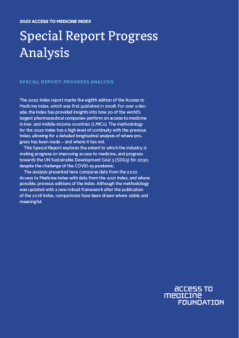Progress seen at board level as companies increasingly integrate strategies to address access to medicine
Date
22 November 2022
This section of the Special Report looks at where there has been a shift from indirect to direct top-level accountability for access to medicine and whether the companies are increasingly embedding an access-to-medicine mindset in their business operations.
Additionally, this section considers changes in how companies ensure compliance with codes of conduct and incentivise good ethical conduct by sales agents.
Governance structures and incentives
Since 2018, the number of companies with either a board member or a board-level committee responsible and accountable for access to medicine activities has increased from 11 in 2018, to 12 in 2021, and 16 in 2022, with Eisai, Bristol Myers Squibb, Merck and Sanofi now also providing evidence of direct board-level accountability for access-to-medicine activities.
In 2019, the Foundation published an independent ten-year analysis titled, “Are pharmaceutical companies making progress when it comes to global health?”, which identified a shift from indirect board-level responsibility for access to medicine towards assigning direct responsibility to a named board member. As the data from the 2021 and 2022 Indexes shows, there has been noticeable progress.
In 2021, 13 companies provided evidence of access-related incentives for senior executives, including the CEO, and regional or in-country management. In 2022, one more company, Gilead, provided evidence of incentives for senior management, indicating only a slight improvement in the companies’ top-level incentivisation of access-related targets and goals.
The 2022 Index finds that three companies have newly implemented an access-to-medicine strategy, meaning all 20 companies now have an access-to-medicine strategy in place to expand access to their products for people living in low- and middle-income countries (LMICs). These companies are AbbVie, Astellas and Daiichi Sankyo. Previously, these companies had only general commitments to improve access to medicine rather than a clear, integrated access-to-medicine strategy.
Nineteen of the 20 companies have integrated their access-to-medicine strategy into their overall corporate strategy, with Gilead having a business rationale for its access-to-medicine strategy that is focused on partnerships to enhance access. This is in stark contrast to the 2021 Index, where just 11 companies had integrated strategies.
While all pharmaceutical companies included in the analysis have set targets and goals related to their access-to-medicine initiatives, companies vary considerably in terms of the quantity and quality of outcome reporting.
For example, several companies report outcomes using centralised, easy-to-digest dashboards detailing how and when short-, medium- and long-term results were achieved for all activities. Other companies do not have such transparent practices; for example, they may share this information via multiple documents or external websites, or only report on certain products or therapeutic areas, making it difficult to gain a complete picture of the company’s activities and hold them accountable.
Ethical marketing and compliance
With respect to risk management of unethical marketing and other practices, the 2022 Index has determined that companies are making strides. AbbVie, Bristol Myers Squibb, Boehringer Ingelheim, Daiichi Sankyo, Gilead and Sanofi newly demonstrate that sales agents' incentives are not based solely on sales volume.
The number of companies decoupling sales agents’ rewards from sales targets has steadily increased over time. Compensation for sales representatives is becoming increasingly tied to qualitative performance indicators, such as technical knowledge or compliance adherence.
The Foundation’s ten-year progress report, published in 2019, found that all 20 companies had auditing controls in place since the 2016 Index. In the 2022 Index, this remains the case. In 2018, the Index began analysing whether companies had additional controls in place to ensure compliance with each country’s regulatory and anti-corruption laws. This included fraud-specific risk assessments, a continuous monitoring system for compliance and processes to ensure third-party compliance.
Of the five controls measured by the Index in 2021, only eight companies demonstrated evidence of applying all of them. In 2022, five additional companies have implemented all controls, meaning there are 13 companies that have a strong – i.e., comprehensive – internal control framework for ensuring compliance. The five additional companies are Bayer, Bristol Myers Squibb, Eisai, Merck and Pfizer.
The full version of the Special Report is available via our Resource Centre.
